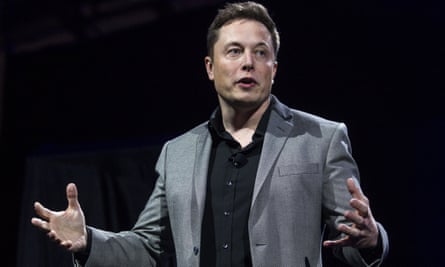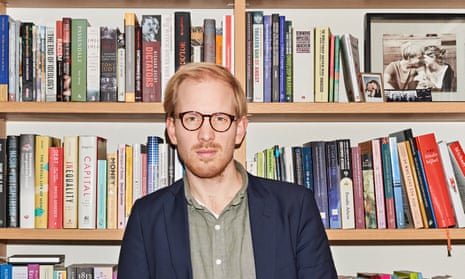As liberal democracy seems to be crumbling under the weight of widespread despondency, some hardline opinions are in danger of becoming received wisdoms. In the global market, we are told, we must work harder and improve productivity. The welfare state has become too large and we need to cut back on benefits. Immigration is out of control and borders need to be strengthened.
The choice seems to be either to accept this new paradigm or risk the likes of Marine Le Pen and Geert Wilders gaining power. The centre ground is being dragged to the left and right, and collapsing down the middle. Meanwhile progressive politics has returned to its comfort zone, busily opposing everything and offering almost nothing. Where is the vision, the ambition, the belief?
Yet into this bleak picture drops a book and an author bristling with hope, optimism and answers. Rutger Bregman is a 28-year-old Dutchman whose book, Utopia for Realists, has taken Holland by storm and could yet revitalise progressive thought around the globe. His solutions are quite simple and staunchly set against current trends: we should institute a universal basic income for everyone that covers minimum living expenses – say around £12,000 a year; the working week should be shortened to 15 hours; borders should be opened and migrants allowed to move wherever they choose.
If that all sounds like fantasy politics, then Bregman has assembled a wealth of empirical evidence to make his case. Better than that, though, it is not a dry, statistical analysis – although he doesn’t shy from solid data – but a book written with verve, wit and imagination. The effect is charmingly persuasive, even when you can’t quite believe what you’re reading.
Bregman lives in Utrecht, arguably Holland’s most progressive city, where cycling is almost obligatory and motorists are effectively deemed guilty until proven innocent. His house is a few yards from the pretty canal that cuts through the centre of a carefully thought-out town.
Thin, with a pallid complexion and a wispy rumour of a beard, he looks even younger than 28, but he speaks with impressive authority on his subject. Bregman does something very smart and mature in his book. Instead of just attacking capitalism and post-enlightenment liberalism, at the outset he celebrates its achievements. He shows the incredible improvements in life expectancy, health, wealth, education and freedoms that have been achieved in the last couple of centuries.
As for much derided globalisation, he credits it with lifting 700 million Chinese out of extreme poverty – hugely more than communism ever achieved. But whereas idealists in the 60s extolled Maoism, regardless of the death and destruction it wrought, no one gets too misty eyed about what the international market has done for China. Why, I ask, are the progressive-minded so reluctant to acknowledge this remarkable turnaround?
“I think the big problem on the left,” says Bregman, “is that it only knows what it’s against. So it’s against austerity, against the establishment, against homophobia, against racism. I’m not saying I’m not against those things, but I think you should be for something. You need to have a new vision of where you want to go.”
Bregman has a vision. And it’s a pretty clear one. But, wait a second. Universal benefit, a 15-hour working week, open borders, really? How?
“I’ve heard for three years that many of my ideas are unrealistic and unreasonable and that we can’t afford them,” he says, by way of preamble to a more comprehensive reply. “And the simple answer is ‘Oh, you want to stick to the status quo? How’s that been working out?’”
In Bregman’s Holland the status quo has taken quite a bashing of late, and as a result the white-haired Wilders, who wants to stop Muslim immigration and ban the Qur’an, has emerged as the country’s most powerful politician. The debate in what used to be Europe’s most tolerant nation has become increasingly toxic. But as bad as that situation is, it still doesn’t explain how a universal basic income would be paid for. “The first thing we should acknowledge,” says Bregman, “is that poverty is hugely expensive. It varies from country to country, but most of the time it’s around 3, 4 or 5% of GDP. If you look at what it would cost just to top up the income of all the poor people in a country, it would cost about 1% of GDP.”
Perhaps, but he’s talking about paying everyone – rich and poor – around £12,000 a year. That’s a vast amount of money. How could that be achieved? You’d have to tax the middle class so much that what they’d receive would be wiped out, and then try to tax the very wealthy at a much higher rate – which has not proven a successful policy, because the rich are very good at protecting their money.
Bregman gets a little bit vague at this point. He says that even neoliberal economists such as Milton Friedman were keen on universal basic income (UBI), although they tend to call it negative income tax. He also notes that the country that has come closest to implementing a UBI is the US, under President Nixon. It was only because the Democrat-controlled Senate thought Nixon wasn’t offering enough money in the basic income that the policy was ditched at the last moment.
He acknowledges that a genuinely universal system would involve a massive overhaul of our tax system and that it would require an enormous amount of public and political support. But you’ve got to start somewhere, is his outlook, and the best place to start is in redefining what we mean by work.
“There was a poll in the UK that showed that 37% of British workers think that their job doesn’t need to exist. Well, it’s not the bin men, and the care workers and the teachers that say that. We’re talking about consultants, bankers, accountants, lawyers etc. The implications of that are radical. We could cut the working week by a third and be just as rich. Probably richer!”
Well, I say, just because someone doesn’t value their job, doesn’t mean that it doesn’t have value. These things can be part of an invisible network of jobs that keeps everything else going. They can’t just be excised like that.
“That’s the best we can come up with nowadays?” he asks, shocked at my dull pragmatism. “People are saying: ‘I feel alienated, I think my job is useless’, and the only answer we have for them is ‘No, no, it’s really useful. You know the invisible hand knows best. We’re paying you so much money, it has to be useful!’”
I say I was thinking more of the film It’s a Wonderful Life, which, after all, is about a banker. He thinks his life is worthless and yet we see the depth of his effect on others when his input is stripped away. Anyway, I take his point. We should reconsider much of what society – through the inequality of financial payment – deems important.
“One of the basic lessons of history,” says Bregman, “is that things can be different. The way we’ve structured our economy, our system of welfare, it’s not natural. It could be different.”
Bregman is the son of a small-town Protestant preacher in the south of Holland. He studied history at university and thought of becoming an academic, but found that life too cloistered. Instead he began working as a journalist, but realised the news was a distorting way of viewing the world. It’s about exceptions – terrorism, corruption, crisis – rather than the everyday means of how things actually work.
So he found a job at a new newspaper, the Correspondent, that enabled him to write in a way that brings together journalism and a more academic approach to the world. The result is a hybrid that’s reminiscent of the New Yorker’s Malcolm Gladwell: lots of compelling anecdotes, backed up with information from an array of surveys and research papers delivered in a tremendously readable style.
But there’s also an extra layer of idealism with Bregman, a belief that people are essentially good and that all it requires is a rational analysis of the facts and good governance to make the most profound and lasting changes. As he repeatedly points out, democracy, equal rights for men and women, the abolition of slavery – these were all once deemed the preserve of utopians.
He quotes approvingly the famous Oscar Wilde formulation: “A map of the world that does not include utopia is not worth even glancing at, for it leaves out the one country at which humanity is always landing. And when humanity lands there, it looks out and seeing a better country sets sail. Progress is the realisation of utopias.”
But utopias also have a habit of turning out to be dystopias. Bregman is alive to this threat, and is scathing in his assessment of the communist experiment, but also argues that the unintended consequences of massive change can sometimes be virtuous too. I mention that in his book he suggests that universal basic income will enable the low-paid to study and then get the kinds of jobs they want to do. In which case, I wonder, who will be a cleaner?
He smiles at the question.
“I think one of the most important facts of basic income would be that it’s not only a redistribution of income, but also of power. So the cleaners and bin men would have a lot more bargaining power. If you look at a university, for example, the cleaners will get paid more than the professors, which I think is an entirely good thing. Professors love their jobs, they don’t need additional money for it. The cleaners don’t like their jobs – well, they get rewarded for it!”
I suggest that someone suffering through a PhD might not share that particular conviction. But he answers with a conviction that has triumphed over doubt. “Basic income would give people the most important freedom: the freedom of deciding for themselves what they want to do with their lives.”
I can imagine many old heads questioning the wisdom of a young man who has barely experienced the stubborn complexity of the world. But Bregman is clearly on to something. Following his advocacy, Utrecht and several other Dutch towns are conducting trials on basic income. Finland has implemented a trial, but only with the unemployed. Two Scottish councils, Fife and Glasgow, are looking at a scheme and the Swiss are also interested. The shadow chancellor, John McDonnell, has said that it “might be an idea whose time has come”, and Benoît Hamon, the French Socialist candidate in the forthcoming elections, has included it in his manifesto. Even visionary US tech billionaire Elon Musk is in favour.

One reason why Musk supports a basic income is that work is likely to become much more scarce in the near future of advanced robotics and artificial intelligence – and that’s also a reason for a much reduced working week. In a way Bregman has less of a hard sell with shorter working hours. History is moving that way and has been for some time. It’s just a question of when and how we’re going to acknowledge the inevitable.
However, there are still problems to iron out, some of which Bregman doesn’t tackle in his book. For instance, expertise tends to be gathered over intense periods of study and practice. Who wants to fly on a plane piloted by someone with limited flying hours, or be operated on by a surgeon who hasn’t done much surgery?
Bregman’s answer is to point out that overworked pilots and surgeons are a danger. Yes, but that doesn’t mean a lack of work is not also a potential menace. Now he gets really fuzzy, saying that there would be a paid 15 hours, and then if pilots and surgeons and other experts wanted they could also work in their spare time. When I try to pin him down on what that would mean, he says we need to redefine work as contributing to society in “your own way”.
This sounds a little too utopian to my ears. Yet if you step back and examine where we are, there is undoubtedly a rational cause to rethink work, especially the well-remunerated jobs that don’t appear to create anything of tangible value. It’s impossible to read Utopia for Realists without wondering at the efficacy of advertising executives, management consultants, speculative currency investors and, yes, perhaps even feature writers.
Probably Bregman’s weakest argument is for open borders – not because it isn’t viable long term, but because he doesn’t really examine the drawbacks. Three obvious problems are 1) population density – if millions more arrived in an already cramped Holland, it would create a great deal of tension to say the least. 2) Cultural conflicts – the large-scale movement of people from one culture into another does present genuine difficulties of assimilation, many of which Holland and other European countries are already contending with. 3) If it is the better-off in poorer countries who are most likely to leave, it robs those nations of a much-needed middle class.
Bregman listens to all these points and says that for him, open borders are not something he believes will happen tomorrow. It’s an aspiration, something to work towards. The same could be said for all of his arguments. However, the critical thing is that he has pointed towards a destination, somewhere that in these embattled times the progressively minded can aim towards, and he’s provided some well-researched evidence to support his contentions.
Yes, he is a utopian, but a practical one. He knows there are many problems to overcome, but the first and toughest is the belief that things can change. In that he has made a major contribution. Listen out for Rutger Bregman. He has a big future shaping the future.
Utopia for Realists: And How We Can Get There by Rutger Bregman (Bloomsbury Publishing, £8.99). To order a copy go to guardianbookshop.com. Free UK p&p on all online orders over £15.
Rutger Bregman will be speaking at London’s How to: Academy conference on 7 March, Second Home, London on 8 March and Bristol Festival of Ideas on 9 March







Comments (…)
Sign in or create your Guardian account to join the discussion